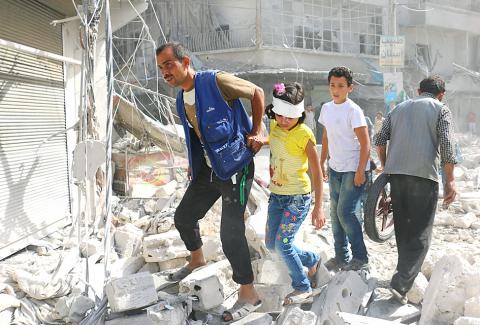Russian and Syrian warplanes yesterday again pounded Aleppo after two days of heavy bombardment that killed more than scores of civilians, as world powers prepared for last-ditch weekend talks on a ceasefire.
More than 20 air strikes hit the rebel-controlled eastern part of Aleppo at dawn yesterday, killing seven civilians, the Syrian Observatory for Human Rights monitoring group said.
On the northeastern outskirts of the city, advancing regime troops captured several hilltops overlooking opposition-held areas.

Photo: AFP
Syrian state television said four children were killed by rebel rocket fire on a school in a Western regime-held neighborhood.
The bombing has killed more than 150 people this week, rescue workers said yesterday.
Airstrikes killed 13 people yesterday, when warplanes hit several rebel-held districts, including al-Kalaseh, Bustan al-Qasr and al-Sakhour, civil defence official Ibrahim Abu al-Laith said from Aleppo.
“The bombing started at 2am and it’s going on till now,” he said.
Seven children were among 71 civilians killed in strikes and regime artillery fire on eastern districts on Tuesday and Wednesday, observatory head Rami Abdel Rahman said.
At least eight civilians were killed in opposition shelling of government-held districts over those two days, according to the British-based monitor, which relies on a network of sources on the ground.
Since the army announced its assault on the city on Sept. 22, Russian and government bombardment on the eastern districts has killed more than 370 people, including 68 children, according to an observatory toll.
Shelling and rocket fire by myriad rebel and militant groups, meanwhile, has killed 68 people in government-held areas.
Several major international efforts have failed to secure a political solution to the war, which has killed more than 300,000 people.
Moscow has come under mounting international pressure over the rising civilian death toll from Syrian President Bashar al-Assad’s Russian-backed campaign to take east Aleppo, including Western accusations of possible war crimes.
A new diplomatic push will take place this weekend. US Secretary of State John Kerry and Russian Minister of Foreign Affairs Sergei Lavrov are expected to be joined in Lausanne tomorrow by their counterparts from Turkey, Saudi Arabia and Qatar — all backers of Syrian opposition forces.
Neither side has confirmed an invitation to Iran, a key player in the conflict and an ally of al-Assad.
Kerry will likely meet up with his European counterparts from Britain, France and Germany in London on Sunday.
The UN said UN Special Eenvoy on Syria Staffan de Mistura had been invited to take part in the talks, but it was unclear if he would attend.
Lavrov on Wednesday told CNN in an interview that he hoped the discussions in Switzerland could help “launch a serious dialogue” based on the now-defunct US-Russian pact.
New Zealand on Wednesday presented another draft resolution to the UN Security Council demanding an end to air strikes on Aleppo.
In other developments, the government has partially approved a UN aid plan for this month, but not the UN’s request to deliver assistance to eastern Aleppo, diplomats said yesterday.
Damascus has given a green light for convoys of 25 to 29 vehicles to besieged and hard-to-reach areas across Syria, they said.

‘TERRORIST ATTACK’: The convoy of Brigadier General Hamdi Shukri resulted in the ‘martyrdom of five of our armed forces,’ the Presidential Leadership Council said A blast targeting the convoy of a Saudi Arabian-backed armed group killed five in Yemen’s southern city of Aden and injured the commander of the government-allied unit, officials said on Wednesday. “The treacherous terrorist attack targeting the convoy of Brigadier General Hamdi Shukri, commander of the Second Giants Brigade, resulted in the martyrdom of five of our armed forces heroes and the injury of three others,” Yemen’s Saudi Arabia-backed Presidential Leadership Council said in a statement published by Yemeni news agency Saba. A security source told reporters that a car bomb on the side of the road in the Ja’awla area in

PRECARIOUS RELATIONS: Commentators in Saudi Arabia accuse the UAE of growing too bold, backing forces at odds with Saudi interests in various conflicts A Saudi Arabian media campaign targeting the United Arab Emirates (UAE) has deepened the Gulf’s worst row in years, stoking fears of a damaging fall-out in the financial heart of the Middle East. Fiery accusations of rights abuses and betrayal have circulated for weeks in state-run and social media after a brief conflict in Yemen, where Saudi airstrikes quelled an offensive by UAE-backed separatists. The United Arab Emirates is “investing in chaos and supporting secessionists” from Libya to Yemen and the Horn of Africa, Saudi Arabia’s al-Ekhbariya TV charged in a report this week. Such invective has been unheard of

US President Donald Trump on Saturday warned Canada that if it concludes a trade deal with China, he would impose a 100 percent tariff on all goods coming over the border. Relations between the US and its northern neighbor have been rocky since Trump returned to the White House a year ago, with spats over trade and Canadian Prime Minister Mark Carney decrying a “rupture” in the US-led global order. During a visit to Beijing earlier this month, Carney hailed a “new strategic partnership” with China that resulted in a “preliminary, but landmark trade agreement” to reduce tariffs — but

SCAM CLAMPDOWN: About 130 South Korean scam suspects have been sent home since October last year, and 60 more are still waiting for repatriation Dozens of South Koreans allegedly involved in online scams in Cambodia were yesterday returned to South Korea to face investigations in what was the largest group repatriation of Korean criminal suspects from abroad. The 73 South Korean suspects allegedly scammed fellow Koreans out of 48.6 billion won (US$33 million), South Korea said. Upon arrival in South Korea’s Incheon International Airport aboard a chartered plane, the suspects — 65 men and eight women — were sent to police stations. Local TV footage showed the suspects, in handcuffs and wearing masks, being escorted by police officers and boarding buses. They were among about 260 South